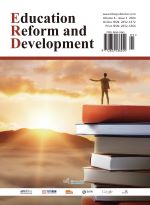Abstract
Imperceptibly integrating ideological and political education into the teaching of computer majors in military schools can build a collaborative model of computer courses and ideological and political education, improve the teaching quality of computer courses and the education effectiveness of military schools, to better implement the fundamental task of cultivating morality and educating people. This requires the computer teachers of the military school to integrate the elements of ideological and political education in the curriculum and give play to its recessive educational role so that computer teaching and ideological and political education form a collaborative education model. Based on this, this paper explores the reform of ideological and political teaching in the computer major curriculum of the military academy, to promote the ideological and political ideas of the curriculum to be better integrated into the classroom of computer major, and lay a solid foundation for the military academy to train more high-quality and outstanding talents.
References
Shi Q, 2023, Research on the Path of Ideological and Political Realization of Computer Major Curriculum. Career, 2023(10): 24–26.
Zhou LM, 2022, Research on Ideological and Political Teaching Reform Practice of “Computer Network Technology Foundation” Course. Computer Application Abstracts, 38(10): 5–7.
Liu AQ, Zhang SL, Xie LP, et al., 2023, Exploration on Ideological and Political Teaching of Computer Major Courses based on OBE Concept. Computer Education, 2023(10): 77–81.
Li Y, Zhang ZC, 2023, Exploration on Ideological and Political Teaching of Computer Courses with “Red and Blue Blending”. Computer Education, 2023(8): 65–69.
Li J, 2023, Research on the Realization Path of Ideological and Political Education in Computer Major Curriculum under the Background of “Three Education Reform”. Computer Knowledge and Technology, 19(11): 126–128.
Zhou J, 2023, Research on the Integration of Ideology and Politics and Craftsman Spirit in Computer Major Curriculum. Journal of Jilin Engineering and Technology Normal University, 39(11): 57–60.
Liu J, 2022, Ideological and Political Innovation and Practice of Computer Curriculum in Higher Vocational Colleges under the Background of Virtue and Education. Journal of Jinan Vocational College, 2022(2): 85–87.
Qiao JS, 2021, Discussion on Ideological and Political Construction of Computer Curriculum in Higher Vocational Colleges. Nanbei Bridge, 2021(13): 3.
Xiong Q, Li J, Xiang Y, et al., 2022, Thinking and Five-dimensional Approach of Promoting Ideological and Political Construction of Computer Curriculum. Computer Education, 2022(7): 122–125.
Fu XB, Li MG, 2020, Research on Ideological and Political Construction of Computer Courses in Colleges and Universities. Decision Exploration, 2020(16): 66–67.
Xu HF, 2021, Research on the Ideological and Political Realization Method of Computer Curriculum in Secondary Vocational Schools under the Background of New Era. Modern Vocational Education, 2021(44): 146–147.
Ding HX, 2021, Research on the Integration of Ideological and Political Education and Craftsmanship Spirit in Higher Vocational Computer Science Courses. Journal of Hubei Open Vocational College, 34(20): 26–27 + 30.
Lin CW, 2020, Exploration of Ideological and Political Education in Computer Science Courses: Taking Compilation Principles as an Example. Modern Vocational Education, 2020(18): 48–49.
Zhang JX, 2019, Practice Analysis of Ideological and Political Construction of Computer Courses in Higher Vocational Colleges. Science and Fortune, 2019(36): 370.
Lang ZH, 2019, Practice Research on Ideological and Political Construction of Computer Courses in Higher Vocational Schools. Journal of Tianjin Academy of Education and Science, 2019(2): 70–77.
